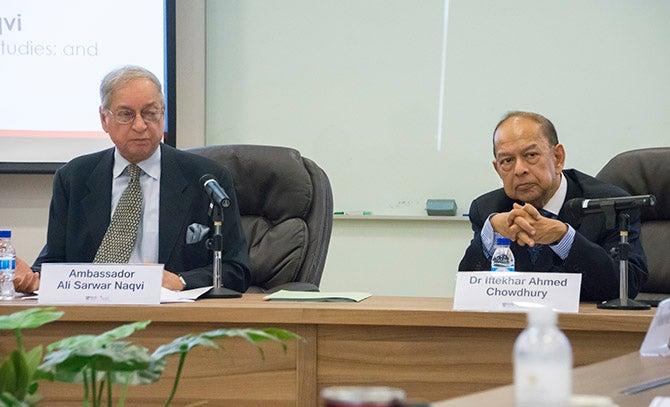
| Event Title: | ISAS Seminar |
| Topic: | Pakistan’s Foreign Policy: Current Issues |
| Date/Time: | 05 June 2018 | 10:30 - 20:17 |
| Venue: | ISAS Board Room, Level 9, 29 Heng Mui Keng Terrace |
| Speaker/s: | Amb Ali Sarwar Naqvi |
| Description: | Ambassador Ali Sarwar Naqvi, Executive Director, Centre for International Strategic Studies and Former Ambassador of Pakistan was invited to speak at a seminar titled ‘Pakistan’s Foreign Policy: Current Issues’. The seminar was part of the Ambassador’s Series, spearheaded by Dr Iftekhar Chowdhury. He opened the session and noted Ambassador Naqvi’s successful diplomatic career and vast experience representing Pakistan. The seminar was attended by the High Commissioners of Pakistan and Bangladesh, as well as other distinguished guests and ISAS Staff.
Ambassador Naqvi began his presentation by discussing Pakistan’s domestic situation and highlighted that the country had made great strides in strengthening democratic institutions, and elections were slated to take place in July this year. He then discussed the country’s foreign relations and challenges. He emphasized that the current issues in Pakistan’s foreign policy could be traced back to the 9/11 attacks in the US, the subsequent war in Afghanistan and its spill over into Pakistan. He next discussed the strained US-Pakistan relations in the context of present-day geopolitics and global power plays and tied these into relations with India – another challenge to Pakistan’s foreign policy. Ambassador Naqvi highlighted India’s refusal to engage and persistent focus on Pakistan’s alleged sponsorship of terrorism as the key reasons for a stalemate in relations. He reiterated that Pakistan wanted to focus on bilateral talks and ‘plucking low-hanging fruit’ to lay the groundwater for more difficult conversations on terrorism and Kashmir. Ambassador Naqvi ended his talk by touching on Pakistan’s strong relations with China and developing ties with Russia. The audience asked a variety of questions. In response to a question about relations with Iran and Saudi Arabia, Ambassador Naqvi noted that Pakistan wished to stay neutral in the sectarian nature of conflict enveloping Middle East. Giving the example of the Iran-Iraq war from 1980-1988, he explained that Pakistan had tried mediation in the conflict but remained impartial. Similarly, at present he noted that Pakistan had enduring ties with Saudi Arabia but was equally mindful of its strong geographical, religious and cultural affinity with Iran. Other questions regarding ISAF in Afghanistan and the recent remarks of former Prime Minister Nawaz Sharif about Mumbai attacks were also discussed. |
| Youtube: | https://youtu.be/osfmoqF4knE |


